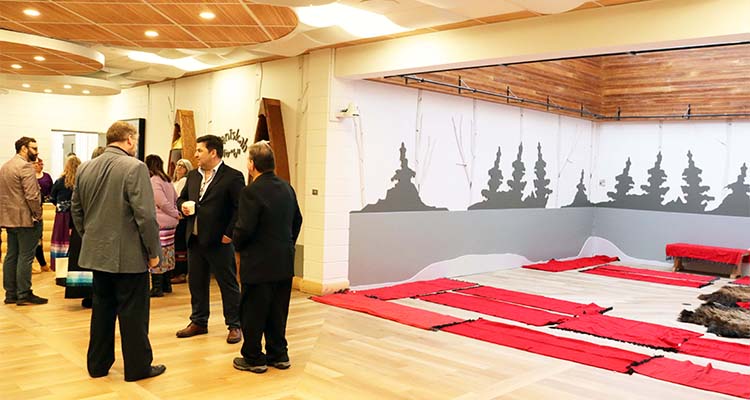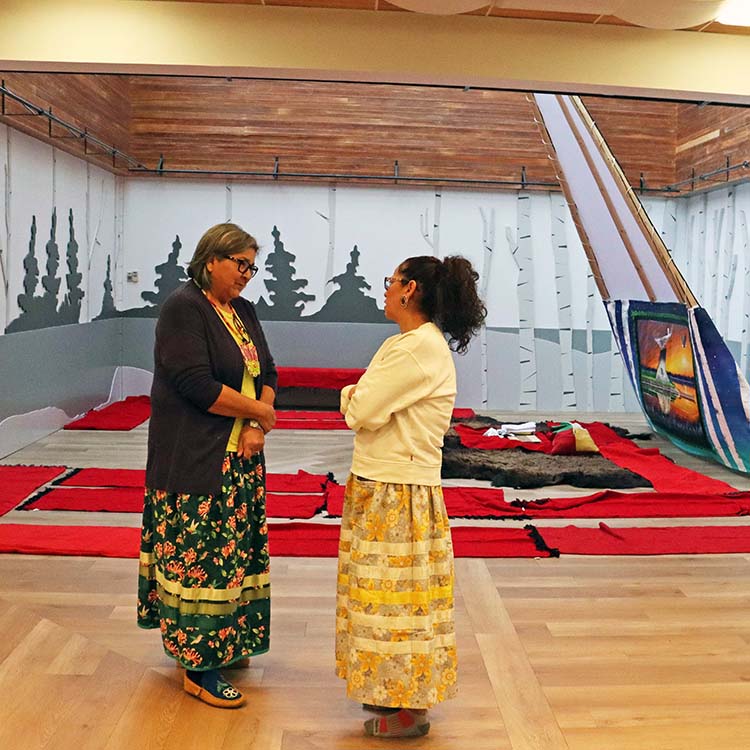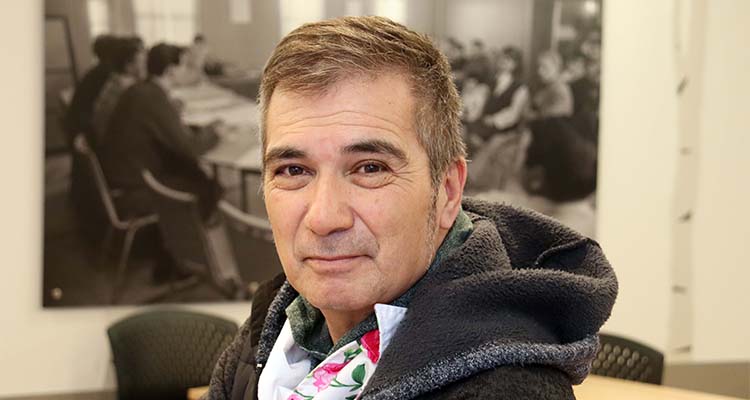A pipe ceremony and feast held at Portage College recently, blended generations-old traditions that bring good fortune and progress with the modern-day process to find the next college president.
The sacred event marked the beginning of the formal recruitment process to replace Portage College President Nancy Broadbent who will be stepping down before the end of 2025. Broadbent has held the role of president at the college since the 2018-19 academic year.
The pipe ceremony took place at the Portage College’s Lac La Biche campus on January 24. The ceremony is a long-standing, sacred custom in Indigenous culture, and because the foundations of present-day Portage College began with Indigenous determination 57 years ago, that culture continues to be a vital part of the College’s operation, says Board of Governors Chair Randy Benson.
“We lift the pipe to honour the traditional practices of our Indigenous communities, as we ask for guidance in selecting the next leader of Portage College,” said Benson. “We believe it is essential to start this process in a way that is respectful, inclusive, and deeply connected to the values that shape our college and our future.”
 Portage College Board of Governors’ chairperson Randy Benson chats with visitors to the wanîskah room before a Pipe Ceremony helped to begin the recruitment process for a new College president.
Portage College Board of Governors’ chairperson Randy Benson chats with visitors to the wanîskah room before a Pipe Ceremony helped to begin the recruitment process for a new College president.
Benson says the role that the First Nations, Métis, and municipalities play in the educational, cultural, and social landscape of the region is “invaluable.”
Connecting traditional and future pathways
Held in the wanîskah áá§áá¢á²á¦ room, a space used for traditional and spiritual reflection, the ceremony drew local and regional dignitaries, including Elders and guests from neighbouring Indigenous communities, many with direct ties to the establishment of the College. Others in attendance included municipal leaders, representatives from several public service departments and Portage College staff.
 The ceremonial area is the backdrop for a conversation between Portage College board of governors’ member Dr. Patricia Makokis and another guest at the recent Pipe Ceremony.
The ceremonial area is the backdrop for a conversation between Portage College board of governors’ member Dr. Patricia Makokis and another guest at the recent Pipe Ceremony.
The ceremony, which saw a traditional pipe lifted and offered to seated guests, was held to send positive prayers, messages and thoughts in the time of transition.
Robert Rayko is the cultural and community facilitator at Portage College. He explained that the pipe smoke sent positive messages to the spirits, asking for continued good fortune, and assistance finding a new president who has many of the traits – especially regarding the respect for Indigenous culture – that Broadbent has exhibited.
 Robert Rayko, the cultural and community facilitator at Portage College, sits in front a wall-sized print depicting the 1970 sit-in protest that kept college doors open and learning available for area residents.
Robert Rayko, the cultural and community facilitator at Portage College, sits in front a wall-sized print depicting the 1970 sit-in protest that kept college doors open and learning available for area residents.
“We have been so fortunate and lucky to have Nancy Broadbent. She has been able to speak with all communities. It has been good to have someone to talk with us and to understand,” said Rayko. “That has been a big honour for us, and we are hoping that our next president will be just as wonderful and amazing … just as understanding and just as accommodating.”
The messages, he said, include a wish for “a strong leader who will continue to listen.”
The Pipe Carrier at the ceremony, Saddle Lake Elder Ben Steinhauer, said the special event also linked the past with a path to the future. That link, he explained is vital for cultures and histories to survive.
Steinhauer’s grandmother, Veronica Morin had a strong voice in the Indigenous community. Growing up, he remembers how she challenged the women around her to be strong and proud, to embrace their cultural roles as leaders and caregivers, to advance their educations, and to find their places in what had long been a male-oriented world.
Morin died in 2013 when Steinhauer was 17, but her legacy, he said, has steered him on the path he walks today. His grandmother, he said, taught him to learn, to listen and to share. Not yet 30, Steinhauer is a young Elder, and he continues to learn and share each day.
“The more things are shared, the more it becomes understood and more familiar,” he said, explaining each step of the pipe ceremony, including a prayer song learned from his grandmother. “Culture is being lost because the details aren’t shared.”
Connecting the sacred traditions of the pipe ceremony to the search for new leadership at an institution that has such close ties to Indigenous culture creates bridges, he said. The ceremony, he explained, helps “to see into the future, to see the obstacles, to be prepared for a journey, to sing the songs to clear the path so you are prepared for what you will be dealing with.”
President is grateful
Portage College President Nancy Broadbent said the pipe ceremony created a positive start to the new transition – both personally and professionally.
“I am very honoured to have Indigenous Elders bless this transition for the College and so grateful that I was welcomed to attend. I feel blessed by the many opportunities to learn about Indigenous culture and to participate in ceremony over the years,” Broadbent said. “The Indigenous People I have met and worked with have been so generous and their commitment to improving life for Indigenous People has been contagious. I want to thank everyone for their partnership and kindness.”
A successful candidate from the ongoing recruitment process is expected to be announced by August of this year. Broadbent plans to stay with the College until November to assist with the transition.